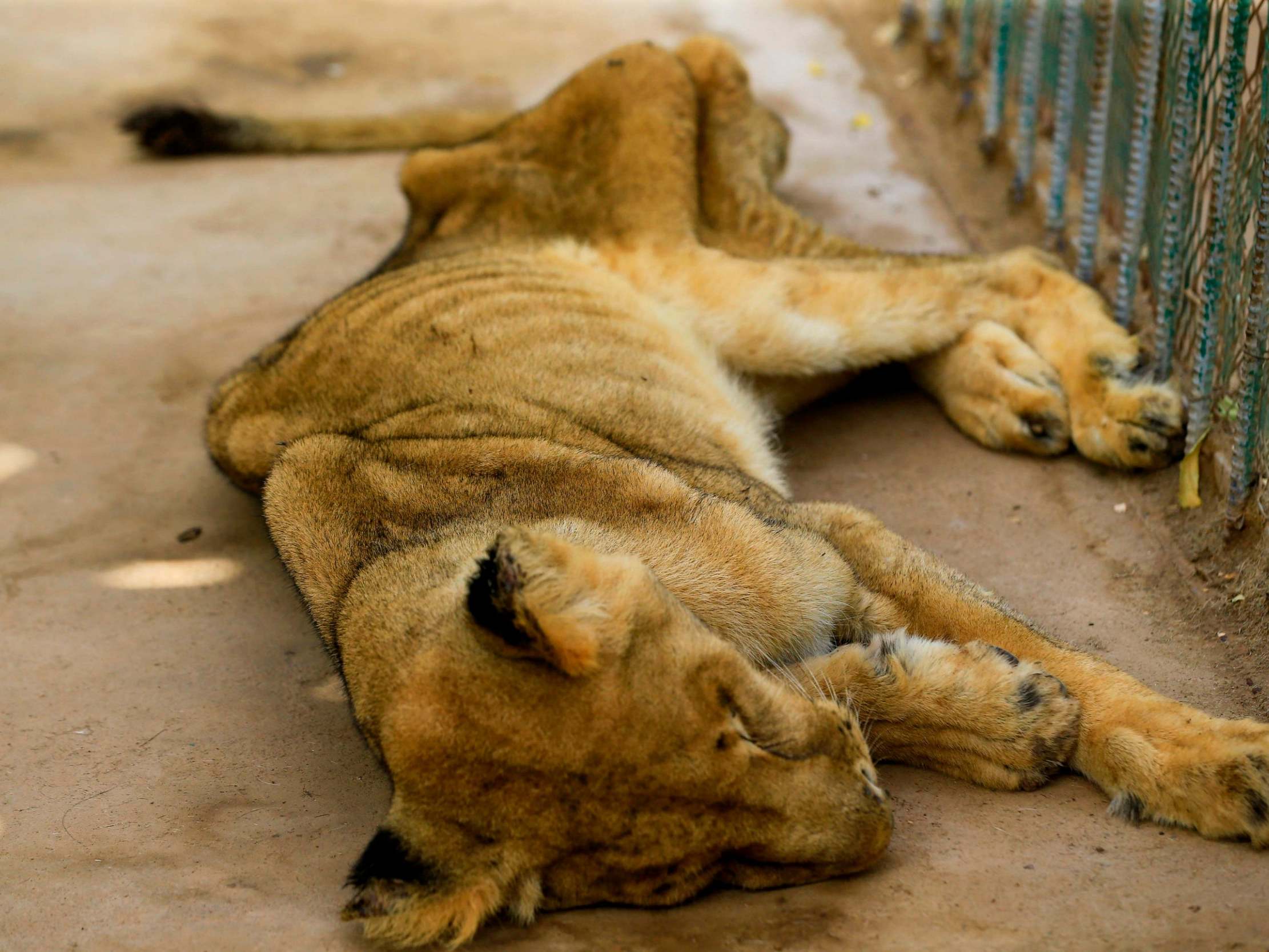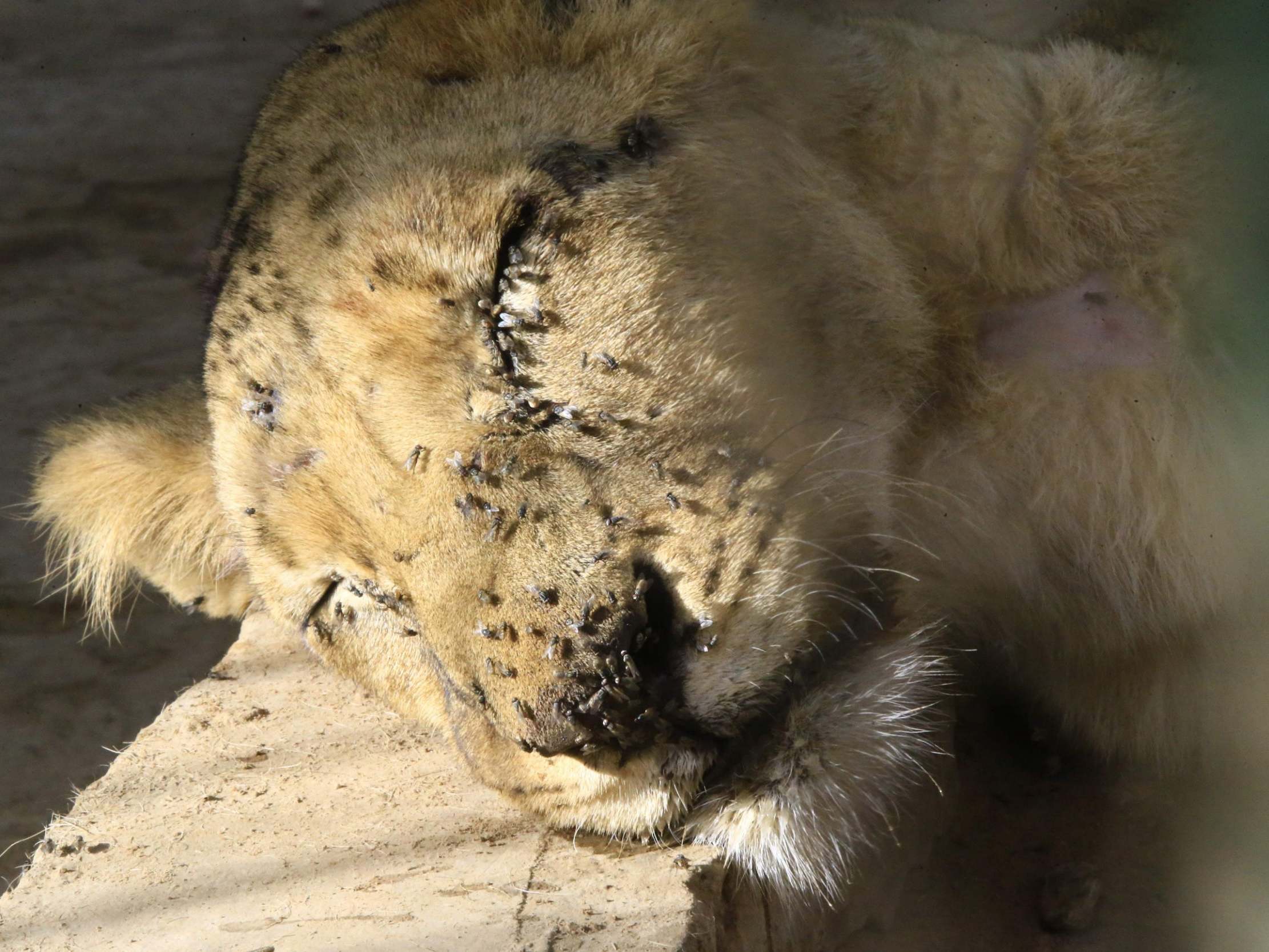Your support helps us to tell the story
From reproductive rights to climate change to Big Tech, The Independent is on the ground when the story is developing. Whether it's investigating the financials of Elon Musk's pro-Trump PAC or producing our latest documentary, 'The A Word', which shines a light on the American women fighting for reproductive rights, we know how important it is to parse out the facts from the messaging.
At such a critical moment in US history, we need reporters on the ground. Your donation allows us to keep sending journalists to speak to both sides of the story.
The Independent is trusted by Americans across the entire political spectrum. And unlike many other quality news outlets, we choose not to lock Americans out of our reporting and analysis with paywalls. We believe quality journalism should be available to everyone, paid for by those who can afford it.
Your support makes all the difference.Photos of malnourished and dying lions at a zoo in Sudan have sparked global backlash and a growing online campaign to save the animals.
The five African lions were found in an emaciated state by activist Osman Salih in Khartoum’s Al-Qureshi Park.
He posted the photos on Facebook, saying the sight of the sickly big cats “made my blood boil” and started the hashtag #SudanAnimalRescue to raise awareness and seek help.
“We have contacted the park administration and they indicated to us that the wildlife police are responsible for these animals and their care and cleanliness and that they were constantly preparing their food but stopped for a while,” wrote Mr Salih.
“The park holds the wildlife police directly responsible for the deteriorating conditions of the lions, and stated that the income of the park for a month is not enough to feed one lion for a week.”
Park officials also blamed the country’s economic crisis for the lion’s poor conditions and said the felines had gone for weeks without adequate food or medication.

The dramatic photos, in which one of the lions’ spines can be clearly seen under its skin, drew anger from social media users, who called the conditions “truly horrific” and “unacceptable”.
“That’s disgusting. People responsible for these animals need locking up and left to starve themselves,” said one person.
Another said: “This is just sad and appalling. Something needs to be done immediately and the persons responsible held accountable. At the very least FIRED.”
According to Mr Salih, veterinarians visited the zoo after his plea for help went viral to assess, feed and medicate the lions wherever possible.
Some of the lions are believed to have lost almost two-thirds of their body weight and at least two were sick. One of the sick female lions died on Monday, confirmed park officials to AFP.
Brigadier Essamelddine Hajjar, a manager at the park, said: “One of the two sick lionesses died today… Yesterday the doctor gave the two some medicines after which they were given food.
“One recovered but the other died. We are diagnosing the cause of death.”
On Monday, Mr Salih said despite the death, there was still positive news as fresh meat was donated or secured from nearby factories and slaughterhouses for the lions.
He added that animal rescue organisation FOUR PAWS International was willing to get involved to help the lions’ dire situation.
“Best news of the day was the willingness of FOUR PAWS International to send an emergency rescue to rehabilitate the animals not only at [Qureshi] zoo but other parks in Sudan as well as train staff at wildlife authority,” he wrote in a post.

However, Martin Bauer, a spokesperson for FOUR PAWS International told The Independent: “FOUR PAWS is aware of the terrible situation of the suffering lions in Sudan.
“At the moment we are closely monitoring the situation and working hard to get access to the zoo. However, we cannot confirm a rescue mission at this stage.
“We are working hard on a solution,” he added.
It is not known how many African lions are in Sudan, but the species are classified as a “vulnerable” species” by the International Union for Conservation of Nature.
It is thought only 20,000 are left in the wild after their population numbers plummeted by 43 percent between 1993 and 2014.
Sudan’s worsening economic crisis, with soaring food prices and a foreign currency shortage, triggered unrest throughout the country as its civilians struggle to get by.

Join our commenting forum
Join thought-provoking conversations, follow other Independent readers and see their replies
Comments